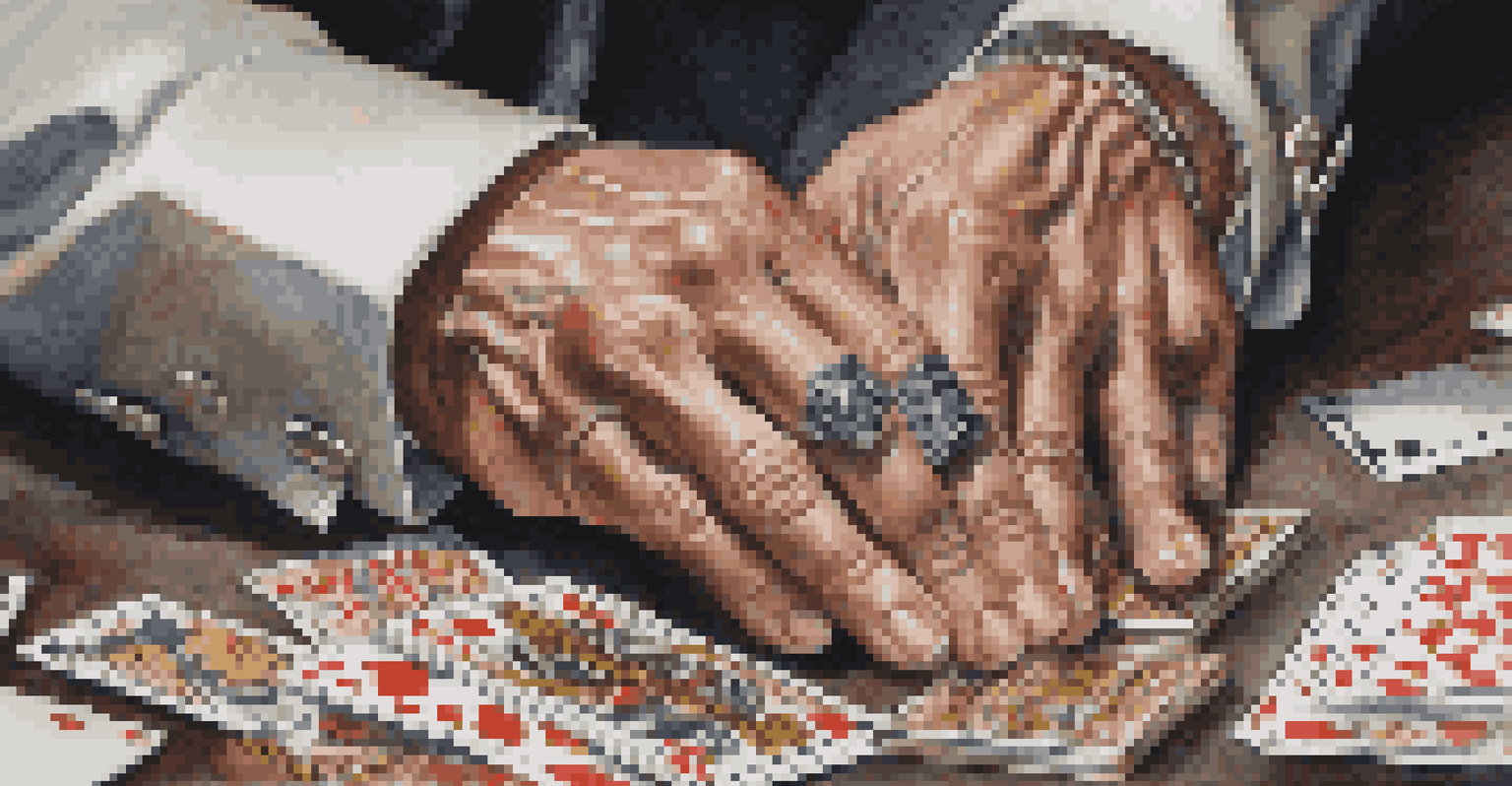The Ethics of Magic: Honesty and Integrity in Performance

Understanding the Ethics of Magic Performance
Magic is not just about tricks; it's an art form that relies on the trust and engagement of the audience. The ethics of magic encompasses the values of honesty, respect, and integrity in performance. By maintaining these ethical standards, magicians can create an enjoyable and memorable experience for their audience, fostering a sense of wonder without deceit.
Magic is the only art that the audience wants to believe is real.
When a magician presents a trick, they invite the audience into a world of illusion. However, crossing the line into deception can lead to a breach of trust. This trust is crucial; when audiences feel misled, the joy of magic can quickly turn to disappointment. Therefore, ethical practices in magic not only enhance the performance but also uphold the dignity of the art.
Ultimately, understanding the ethics of magic helps performers navigate the delicate balance between illusion and reality. It encourages a dialogue about what is acceptable in entertainment, ensuring that both performers and audiences can enjoy the experience without ethical dilemmas.
The Role of Honesty in Magical Performances
Honesty in magic doesn't mean revealing all secrets; rather, it’s about being transparent about the nature of the performance. A magician can create an atmosphere of mystery while still respecting the audience’s intelligence. This approach not only enhances the performance but also builds a stronger connection between the magician and the audience.

When performers honestly present their craft, they set the tone for a respectful experience. For instance, some magicians openly acknowledge that what they do is an illusion, which can deepen the audience's appreciation for their skills. This honesty allows spectators to engage with magic as a performance art rather than a means of deception.
Ethics Enhance Magic's Experience
Maintaining ethical standards in magic fosters trust and creates a memorable experience for the audience.
By fostering an environment of honesty, magicians can elevate their craft. Audiences are more likely to be enchanted by a performance that respects their perception and intelligence, creating a memorable experience that goes beyond mere tricks.
Integrity as a Foundation for Magical Arts
Integrity in magic refers to the commitment to ethical principles that guide a magician’s performance. This includes not exploiting audience vulnerabilities or using misleading tactics that could cause harm. By prioritizing integrity, magicians can create a safer space for all, ensuring that everyone enjoys the art form without fear or discomfort.
The secret of magic is that it’s a lie, but it’s a lie that we want to believe.
Consider the impact of a magician who uses their platform to uplift or inspire audiences. By integrating messages of positivity or wonder into their performances, they not only entertain but also contribute to the well-being of the audience. This respectful approach reinforces the idea that magic can be a force for good.
In essence, integrity serves as a guiding principle for performers. It helps maintain a standard of excellence and respect that resonates with audiences, ultimately contributing to the longevity and appreciation of magic as an art form.
Audience Engagement: The Ethical Connection
An essential aspect of magic is audience engagement, which hinges on the ethical relationship between performer and spectator. When magicians engage with their audience authentically, they create a shared experience that enhances the impact of their performance. This connection fosters trust, allowing the audience to suspend disbelief and fully immerse themselves in the magic.
Effective audience engagement requires understanding and respecting boundaries. Magicians should never pressure spectators into participating in ways they’re uncomfortable with. By prioritizing consent and comfort, performers can ensure that their magic is an enjoyable experience for everyone involved.
Honesty Builds Audience Connection
Being transparent about the nature of magic allows performers to engage audiences authentically and deepen appreciation.
Moreover, engaging with the audience ethically can lead to unexpected moments of joy and surprise. When spectators feel valued and respected, they are more likely to respond with enthusiasm, creating a vibrant atmosphere that amplifies the magic.
The Fine Line Between Illusion and Deception
In magic, there’s a delicate balance between creating illusions and crossing into deception. While the essence of magic lies in crafting a believable illusion, it’s vital for magicians to recognize the difference between entertaining and misleading. This awareness can guide performers in making ethical choices that enhance rather than undermine the audience's experience.
For example, using props, misdirection, and storytelling can create a compelling illusion without compromising honesty. Good magicians can lead the audience on a journey that feels real, yet remains clearly rooted in fantasy. This approach respects the audience's intelligence while still delivering the thrill of the unexpected.
Ultimately, understanding this fine line helps magicians refine their craft. It encourages them to think critically about their performance choices, ensuring that they remain true to the ethical standards of their art.
Ethical Challenges Faced by Modern Magicians
As the world of magic evolves, so do the ethical challenges faced by performers. With the advent of social media and digital platforms, magicians often grapple with issues such as copyright, originality, and the portrayal of their work. These challenges require a thoughtful approach to ensure that they respect the rights of others while promoting their artistry.
Additionally, the rise of online magic has blurred the lines between performance and reality. Magicians must be mindful of how their tricks and illusions can be perceived through a digital lens, ensuring they maintain ethical standards even in a virtual space. This calls for a commitment to authenticity and integrity, regardless of the medium.
Integrity Guides Ethical Performances
Integrity in magic ensures that performers respect their audience and contribute positively to the art form.
By addressing these modern challenges, magicians can contribute to a richer, more ethical landscape in the performance world. It’s an opportunity to innovate while remaining true to the core values that define ethical magic.
Fostering a Culture of Ethical Magic
Creating a culture of ethical magic involves education, dialogue, and community support. Magicians can benefit from sharing experiences and discussing ethical dilemmas they face in their craft. By fostering an open environment, performers can learn from each other and develop a shared understanding of what it means to practice magic ethically.
Workshops, conventions, and online forums can serve as platforms for these important conversations. They provide opportunities for magicians to explore ethical topics, share insights, and collaborate on finding solutions to common challenges. This community-driven approach strengthens the bonds between performers and enriches the magic community as a whole.

Ultimately, a culture of ethical magic not only benefits the performers but enhances the audience experience as well. When magicians commit to upholding ethical standards, they ensure that magic remains a beloved and respected art form for generations to come.